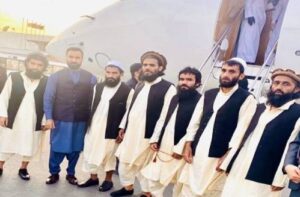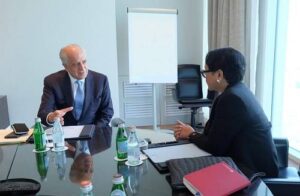.jpg)
The Afghan president arrived in Tehran on Saturday, 3rd August to attend the inauguration of Iranian President Hassan Rouhani. However, President Mohammad Ashraf Ghani did not receive the same warm welcome as former President Hamid Karzai used to.
This was the third visit of the Afghan President to Iran.
Over the course of the 16-year-old U.S.-NATO presence in Afghanistan and the establishment of a new government in Kabul, Karzai had been to Iran several times, but President Ghani's recent visit to Iran can be regarded as quite different and less ceremonial in terms of diplomacy.
Former President Hamid Karzai, on the other hand, also occasionally appeared to be over-expectant, so much so that he did not endorse the Bilateral Security Agreement with the U.S. to his last day in office, and won the praise of Tehran or, despite his Pashtun lineage, he did not show inclination towards negotiations with the Taliban in Riyadh. Because, he insisted that the world should understand the roots of terrorism are not in Afghanistan, but it is a mischief on the policies of Saudi Arabia and Pakistan.
President Ghani did not continue his predecessor’s path. Immediately after assuming power following disputed elections, and willingness to partner with his rival presidential candidate Abdullah Abdullah, he signed the BSA with the U.S., and since three years in office as the President, he has travelled to Riyadh three times and has, and supported a controversial move by supporting Saudi Arabia in the Yemen conflict.
However, none of these actions prompted reactions from the Rouhani government such as requesting to delay Ghani’s trip to Tehran, and instead, Tehran welcomed President Ghani warmly and arranged serious and explicit conversations with him and his delegation in the past. The main focus of the participation in Rouhani’s inauguration was to have talks on the sidelines about the narcotics issue, water management between the two countries and the rights of the Afghan immigrants there.
Including the announcement by Afghanistan of its willingness to support the Taliban, so that the Taliban can avoid Iran’s attention. Obviously, Iran is unhappy with Afghanistan's recent moves to develop dams and its water sources, and it can be guessed that President Ghani has justified the construction of water dams, and as country’s President has expressed his willingness to defend his country, and end Iran’s opposition on water issues via dialogue.
In contrast, Iran is not empty handed, it still has few tricks under its sleeve. Rouhani will directly talk to Ashraf Ghani, in order to improve the relationship with Iran and solve the water problem.
There is no doubt that President Ghani prefers the U.S., Saudi and Pakistan security triangle over Iran, and this choice is evident in his speech and behavior. But, he can never afford to become come out Iran’s grip from Iran, not only because of the long, common ground with Iran that is due to other realities as well but for following reasons:
First, the Afghan Shiite are supporters of Iran, as the ties which have kept Pakistan close to Saudi Arabia same applies to Iran as well. While a significant number of Shiite populations are in transit between the two countries, and it is likely that Iran can be lenient with issuing work and visit visas to Afghans and reap the harvest of politics.
Second, Afghanistan has a direct dialogue with the United States, and Iran can use good Afghan mediation, to talk to U.S.
The third fact is that the Afghan National Unity Government is actually the combination of two parts and Iran can put weight on Abdullah Abdullah’s scale. Hence, Ashraf Ghani cannot put all his eggs in Saudi Arabia’s basket, and this is the fact that he was actually informed on his trip to Iran. Ashraf Ghani is well acquainted with the experience of working for many years in international organizations to understand these types of modules.
The remarkable thing is that on the previous trips, although Karzai's position was softer, there was actually a warmer welcome. This time, however, despite serious differences, two neighboring countries over looking at terrorism, ISIL, Saudi Arabia, attack on Yemen, and a security treaty, the talks seemed more serious and useful.
.jpg)
It should be remembered that in August of 2010, in the tripartite meeting of the Persian (Farsi) speaking countries in Tehran, the most important issue was that Hamid Karzai was welcomed with "Khakshshir" (a tradition drink), and the President of Afghanistan repeatedly thanked, host, Mahmoud Ahmadinejad for bringing him to childhood memories and restoring his mother's memory.
This time, of course, Ghani was not welcomed in Tehran with Khakshir, but he understood beforehand that more than he could come close to Saudi Arabia, he cannot do so any longer as he is sharing power with Abdullah, and he would no longer be able to ignore his partner, which is to some extent closer to Tehran, especially as the lead of executive office is with Dr. Abdullah.
More importantly, the fact that Iran has a much more influential role in Kabul-Tehran relations and Ashraf Ghani is aware of this fact. If he has to establish relations with Tehran in such a way as to avoid hurting one of the two sides, this is a problem for Iran to knock on every door to improve these relations.
By: Sayed Enam Salehi
Translated from Persian





